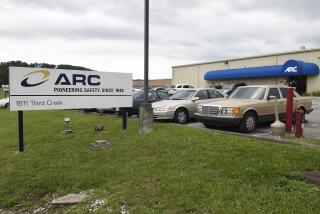Tire Deaths Bring Push for Criminal Cases
- Share via
As the number of deaths linked to defective Firestone tires continues to pile up, pressure is mounting for state and federal prosecutors to open criminal investigations against both Bridgestone/Firestone Inc. and Ford Motor Co. for not warning consumers earlier about the potential hazards.
Already several state attorneys general have asked Firestone and Ford to turn over documents showing what executives of both companies knew of the situation, and when they knew it.
An official with the Florida attorney general’s office, which is investigating both Firestone and Ford under the state’s anti-racketeering law, said the matter could be referred to criminal investigators, depending on what information is unearthed.
Attorneys general of several other states, including Tennessee, Georgia and Connecticut, have filed similar subpoenas and requests for information.
Legal experts say potential criminal charges could range from negligence to homicide.
“Consumers are anxious and outraged at the apparent early knowledge of these companies as to the defects of the tires,” said Connecticut Atty. Gen. Richard Blumenthal. He added that he could not comment about whether he would seek criminal charges against Ford and Firestone.
The state investigations come as bipartisan support is growing in Congress for criminal penalties against tire and auto makers that fail to notify the National Highway Traffic Safety Administration about recalls in other countries.
A bill that seeks to impose prison sentences of up to five years and fines of up to $250,000 is being promoted by U.S. Sen. Patrick J. Leahy (D-Vt.) and Rep. Asa Hutchinson (R-Ark.).
Sen. Arlen Specter (R-Pa.) has gone even further, introducing a separate bill authorizing federal prosecution of any manufacturer that knowingly exposes consumers to risky products that cause death or serious injury.
Specter has said in floor speeches and elsewhere that corporate officers could be prosecuted for second-degree murder if they showed reckless disregard for consumers by allowing life-threatening products to remain on the market.
“If I were a state D.A. and had a case like this [where someone died as a result of a defective Firestone tire], there would be a prosecution at the snap of the finger,” Specter said in an interview with The Times.
Especially galling to Specter, Leahy and other lawmakers is evidence that Ford and Firestone were replacing tires in Venezuela and Saudi Arabia long before NHTSA’s Aug. 9 recall of about 6.5 million Firestone AT, ATX, and Wilderness II tires.
“It’s an atrocious situation,” Specter said. “They took care of the Saudis and the people in Venezuela before [U.S. consumers].”
Congressional hearings last week established that both Ford and Firestone knew of problems well before they were reported to U.S. safety agencies. Ford conducted recalls of Firestone tires on Explorers sold in Saudi Arabia and other Middle Eastern countries without informing U.S. safety officials.
Specter’s assertion that second-degree-murder prosecution might be applied in such cases was supported by top white-collar criminal attorneys.
These attorneys pointed to a 1980 case against Ford pursued by a small-town prosecutor in Elkhart, Ind. In that case, the first criminal prosecution of a U.S. corporation in a product-liability case, Ford was charged with reckless homicide after three teenage girls died in a Ford Pinto car that burst into flames following a rear-end collision.
The prosecutor claimed that Ford knew that the Pinto’s fuel system made the car likely to explode in low- to moderate-speed rear-end crashes, but failed to repair them or warn the public of the danger.
Ford, which claimed that the Pinto was as safe as other subcompacts, was acquitted after a three-month trial, but experts said the case set an important precedent.
“Firestone has reason to be concerned whether some district attorney could institute an investigation to see if the company willingly allowed a product with known defects out on the highways, at the public risk,” said George B. Newhouse Jr., a defense attorney and former head of the U.S. attorney’s public corruption and government fraud unit in Los Angeles.
James F. Neal, a former Watergate prosecutor who successfully defended Ford in the Indiana Pinto trial, said state authorities could pursue a criminal case if prosecutors believe that a person or company has placed a dangerous product in the marketplace, knowing that it could hurt or kill consumers.
Neal, whose Nashville law firm has represented Firestone in the past, declined to say whether the firm had been retained to represent the tire maker in the latest situation.
A spokesman for Firestone, which is headquartered in Nashville, said the tire maker’s executives have no reason to believe that the recall will result in any criminal investigation against the company.
“We think that would be counterproductive,” the spokesman said.
At Ford, spokesman Mike Vaughn said: “We have attempted to be as open and transparent . . . as we can to get information to the public and to get the bad tires replaced as early as possible. As soon as we saw the data at the end of July, which was furnished to us by Firestone, we moved quickly to communicate to the public.”
The push for criminal penalties has long been advocated by Ralph Nader-founded groups, including Public Citizen and the Center for Auto Safety in Washington.
Specter said he agrees with the contention that some companies “do cost analyses and find it cheaper to pay the damages than to correct the defect.”
Advocates of criminal penalties say that relying on civil sanctions to get manufacturers to make safer products simply does not work, because in many cases judges or appeals courts slash large jury awards.
Leahy said multibillion-dollar corporations can afford to pay fines without changing their behavior.
“The fine is usually less than what they might pay for the annual company party,” the senator said. “If a company official knows beyond any question they might actually go to jail, they’re far more apt to comply.”
More to Read
Inside the business of entertainment
The Wide Shot brings you news, analysis and insights on everything from streaming wars to production — and what it all means for the future.
You may occasionally receive promotional content from the Los Angeles Times.










